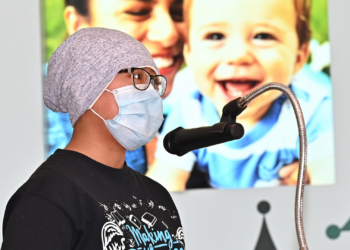October is Breast Cancer Awareness Month. In honor of survivor Fitz Koehler and other women who have battled this disease, learn more about detecting Breast Cancer or make a donation to the cause at nationalbreastcancer.org
We all care about someone with cancer, and we’ve all found ourselves in a place where we wonder, “What can I do?” It’s common to feel completely powerless when someone we care about is diagnosed with cancer. I’ve been there several times. But now that I’ve been through my own grueling death match with the big C, I can share some insight on how to provide thoughtful support to make your favorite cancer patient’s life a bit easier.
Four months after my 21st and final round of chemotherapy, I still can’t believe I had breast cancer. I also can’t believe that I endured the dreaded cure for it. Chemo, radiation, surgeries … all of it. I’m a fitness expert and professional race announcer. I make my living promoting health and I have always walked the walk! It’s been very strange to wrap my head around it all, but the reality is that I went through it and I got through it. I will celebrate that for the rest of my life. And while I alone had to endure the cure, taking all of the pokes, prods and toxic drugs, I wasn’t always alone. The support I received from my family, friends, colleagues and strangers proved to be a powerful part of my cure both physically and emotionally. In my new memoir, My Noisy Cancer Comeback, I talk a lot about that.
I’m traditionally independent to a fault and spend much of each year zigzagging across America to host 25-30 massive running events. Asking for help is a skill I lack for many reasons. But when the side effects of chemo kicked in, help from my loved ones became essential to my well-being.
I’ll break these bits of help for cancer patients down into three categories: functional, emotional and miraculous. It all mattered and it all contributed to the fact that I’ve bounced back post-treatment quickly and with joy in my heart. Hopefully some of my experiences will allow you to support your loved ones in a meaningful way.
Functional Support
One of the simplest ways to support a loved one with cancer is to help them meet their physical needs: things like food, rest, or a clean house. As my treatment began, so did a meal train organized by a good friend. Several times a week, people dropped off homemade meals, dishes from our favorite restaurants and gift cards to food delivery services. I didn’t think I’d need that, but when my tummy exploded because of chemo one afternoon – my first thought was “Oh no. How am I going to make dinner for my kids?” Magically, a neighbor chose to stop by with a meal that very evening. They had no clue what a save they were making, but I was in a panic before they arrived.
Several friends also volunteered to drive my kids to school and activities, which allowed me to remain at medical appointments or get much-needed rest on many occasions. Sometimes I was simply too sick or loopy to drive. A local housecleaning service also donated two visits to my home. My husband had been keeping up on all of the basics, but it was a tremendous relief when they scrubbed the bathrooms and kitchen floors.
Emotional Support
The stress that comes along with being a cancer patient is unlike any other. I used to feel like I was made of stone, but cancer frequently turned me into a sobbing, shaking basket case. My doctors provided support by looking me in the eyes and assuring me that they were going to cure me. I never went to a scary appointment alone, because my husband and friends wouldn’t allow that. My runners and colleagues pampered me at races by taking time to stop by for hugs and to tell me they loved me. Friends far and wide would send cards, emails and texts. A few special friends would start each text with “Please don’t feel obligated to reply, just know that I love you and I’m here if you need anything.” Quite often I was too sick to even text, so being given permission not to respond removed a lot of pressure.
Everywhere I went with my shiny bald head, strangers made little efforts to support me with little things like lifting my luggage, telling me I was pretty or engaging me in caring conversation. I never wore a pink ribbon or a breast cancer shirt. Folks just knew what I was going through and wanted to make my life even a tiny bit easier. I highlight an awesome experience with a flight attendant in my book who just couldn’t restrain himself. He needed to care for me and did so in such a sweet way that he left a long-lasting warm spot in my heart. Our experience began with him giving me no less than 10 packs of cookies from his food and beverage cart, and ended with a sweet sentiment and a simple yet heart melting gift on my way off of the plane.
Miraculous Support
I can comfortably share that I pushed my limits during my experience with cancer. Maybe it wasn’t smart, but I chose to live my life fully and I have no regrets. However, I did have a moment while standing on a start line stage announcing a race in Denver when I came just 30 seconds shy of passing out in front of 10,000 people. However, right as everything was turning yellow and the sky started spinning, my sound engineer spontaneously stopped by to bring me Gatorade and some snacks. It was exactly what I needed and the only thing that kept me from injury, embarrassment and a trip to the hospital. I had a handful of similar saves throughout my battle. You never know when a simple kind act will be the thing that saves someone’s day.
Folks, cancer is awful. Each case is as unique as a snowflake no matter what type of cancer we’re dealing with. The simple fact that you’re reading this article makes me confident that you would love to be of service to someone special. What I can tell you is that all of your efforts count. If you are nearby … be functional. Bring food, help with kids, pets, housework and be patient. Drive your cancer patient to appointments, offer to shop, clean or mow the lawn. Be creative and be pushy. They’ll eventually cave to your support. Notes, cards, calls and visits mean a ton too, as long as you clearly state “I’m happy to leave when you’re tired,” or “No reply necessary.”
Lastly, be creative and resourceful. Sure, it’s hard to know exactly what a person needs if they won’t tell you, but it’s better to do something than nothing. As strong as I am, there were many days that if my husband didn’t bring me a drink, I wouldn’t have had a drink. I was too sick to go to the kitchen. I agonize for people enduring this experience alone. You never know when your spontaneous support may be miraculous for the cancer patient.
Connect with me at Fitzness.com or @Fitzness on Instagram— I would love to hear your ideas on the subject! I’m rooting for all of you.
FItz Koehler, M.S.E.S.S.
To pre-purchase a copy of Fitz’ book, My Noisy Cancer Comeback: Running at the Mouth While Running for My Life, please visit her website, Fitzness.com. All books purchased at Fitzness.com will be signed and come with a special gift.
















